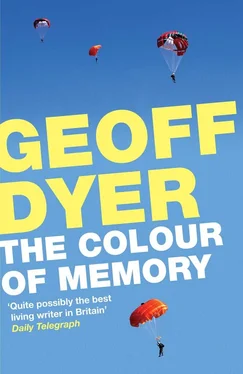‘Is someone who lives here sculpting that?’ Steranko asked.
‘Yeah, I don’t know his name though.’ On the afternoons that I’d been up on the roof I’d watched him work on it, enjoying the gentle tap of the chisel and the way the form of the woman slowly emerged from the hard block and the cloud of white dust.
Today had been the first time in several weeks that it had been hot and sunny; little progress had been made since I’d last seen the sculpture. The bricks of the low wall behind our backs were still faintly warm, breathing the last of their accumulated heat into the cool night air. On the roof of the opposite block I saw the dark shapes of a man and a woman, his arm around her shoulders. I waved at them and they waved back, the red glow of a cigarette tracing the movement of a hand.
‘Shall we have a joint?’ I said after neither of us had spoken for a while.
‘Good idea.’
‘Can you sort that out?’ I pulled a bag of grass and some papers out of the pocket of my trousers. ‘I’ll bring some coffee up.’
‘Hey, can you bring up your cassette player? I made this tape today — it’s unbelievable.’
‘Sure. What’s the tape?’
‘It’s a Mahler symphony. The third.’
Making coffee in the kitchen I thought about Foomie. There was an inevitability about her being attracted to Steranko that destroyed even the possibility of jealousy. Instead of wishing that Foomie was attracted to me I found myself wishing that I was more like Steranko. Just as there are individuals who are always on the periphery of a given group so there are those like Steranko who, you know, will always be at the defining centre of other people’s lives.
By the time I came back up with everything Steranko had rolled a clumsy joint with the home-grown grass. Steam floated off the dark surface of the coffee.
We took turns pulling deeply on the joint and exhaling grey smoke that hung sweetly in the air for a moment and then disappeared. To the west the sky was tinted orange. I read odd pages of Nietzsche. My mind wandered. We watched clouds moving fast across the moon; the lights of a plane overhead. Neither of us said anything for a while. Steranko rewound and fast-forwarded the cassette player until he found the place on the tape he wanted.
‘Right, this is the fourth movement: Vas meer die Nacht erzalt,’ he added in Colditz German.
‘What does that mean?’
‘I dunno. Something, something, night, something.’ Our laughter floated away and quietness gathered round us. The noise of the traffic was still there but quieter, further off, like the sea at low tide. Sheets hung out to dry on the opposite block, visible only as grey squares in the darkness, shrugged in the breeze. There was no sign of the couple we’d seen earlier. A few lights were on. The steady flame of the hurricane lamp, the tape running noiselessly. Then, hardly audible, barely distinguishable from the silence that preceded it, came the sound of a woman’s voice.
Each syllable was like a breath, insubstantial as the night air. The voice was so frail a gust of wind could have blown it away. The singer’s lone voice gathered the night’s silence into itself and slowly overcame it, pulling itself out of the silence like the sculptured form of the woman, pulling herself clear of the rock. The voice continued its long, slow ascension, angular syllables stretched out and hanging for long seconds in the darkness.
O Mensch! O Mensch!
Tief! Tief! Tief ist ihr Weh!
Tief ist ihr Weh!
The voice came from the throat of the darkness. The light from the hurricane lamp wavered.
Steranko leafed through the grimy pages of the book, folded it back on itself and passed it to me without speaking. Half his face was in shadow. In the vacancy left by the music, in the silence that craved the lone voice of the woman, I read:
What, if some day or night a demon were to steal after you into your loneliest loneliness and say to you: ‘This life as you now live it and have lived it, you will have to live once more and innumerable times more; and there will be nothing new in it, but every pain and every joy and every thought and sigh and everything unutterably small or great in your life will have to return to you, all in the same succession and sequence — even this spider and this moonlight between the trees, and even this moment and I myself. The eternal hourglass of existence is turned upside down again and again, and you with it, speck of dust!’
Would you not throw yourself down and gnash your teeth and curse the demon who spoke thus? Or have you once experienced a tremendous moment when you would have answered him: ‘You are a god and never have I heard anything more divine.’
The words broke over me. I stared into the dark sky above and around us. The night remembered the voice. The night remembered how the voice had needed the night. There were no stars, only the red and white blink of a plane, the steady flicker of the hurricane lamp.
Something about that evening made me think of a day several years ago when I hardly knew Steranko. I was sitting in the Arizona, a cafe near the house on Water Lane where we spent a lot of time, reading the papers, chewing bacon sandwiches and ordering tea. Stan, who ran it, thought we were students who’d squatted a place nearby. To him that made us the lowest form of life imaginable, exactly the kind of people, in other words, that his establishment took pride in catering for. When we started going there builders from a nearby site would come in at about eleven thirty and start wading into cardiac-sized plates of eggs, chips, beans and fried ketchup. Gradually the reputation of Stan’s cafe spread like the smell of eggs and soon its clientèle was made up entirely of squatters, students, anarchists and hopeful intellectuals looking for authentic proletarian experience. The builders drifted away; lorry drivers came from miles around to avoid the place. It got more and more crowded. One day the restaurant critic from Time Out showed up and selected it as one of the best vegetarian restaurants south of the river. It soon became the kind of place in which a working knowledge of the novels of Jack Kerouac was preferred if not actually required.
It was a freezing January afternoon when Steranko came round. He’d called at the house and been directed over to Stan’s by our next door neighbour who said some of us were sure to be there. We shook hands and he ordered a plateful of everything.
At that time Steranko was living in a house near Vauxhall. He suggested we spend the rest of the afternoon over there. I had nothing else to do so we paid and left.
Outside the wind cut through our clothes and crashed into our nostrils. As soon as you set foot outside what you most wanted to do was get back inside. Even the wind wanted to be indoors. It howled and twisted round blocks of flats, trying to squeeze through windows and force its way in through a few inches of open door. The sky was a charcoal smudge of clouds. A couple of blown-out umbrellas rolled around. What I thought was some new kind of bird — square, black, shiny — turned out to be a piece of black polythene kicked around by the wind. The restless sound of empty cans.
We saw a couple of buses coming and started to run for the stop. Two 3s and then, a little way behind them, another, hurtled past in convoy, half-empty.
‘Three 3s.’
‘That’s the best combination of buses you can get,’ Steranko said, breathing hard. ‘It beats anything.’
‘There won’t be any more buses for a couple of days now,’ I said peering at the timetable. It was all pearled up with frost, impossible to read.
‘Fuck it. Let’s walk,’ said Steranko.
Читать дальше












